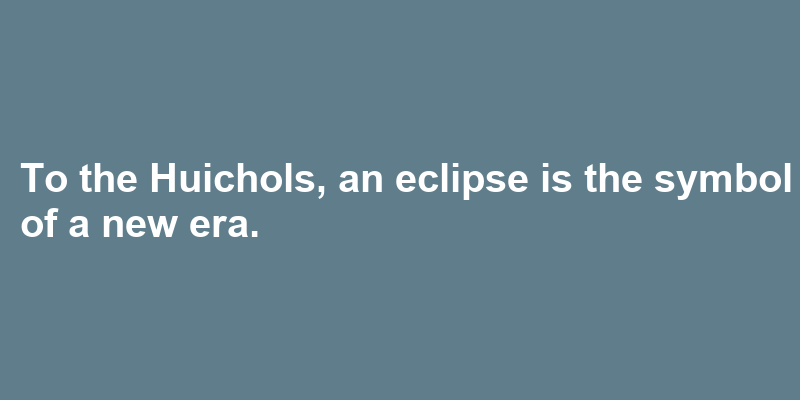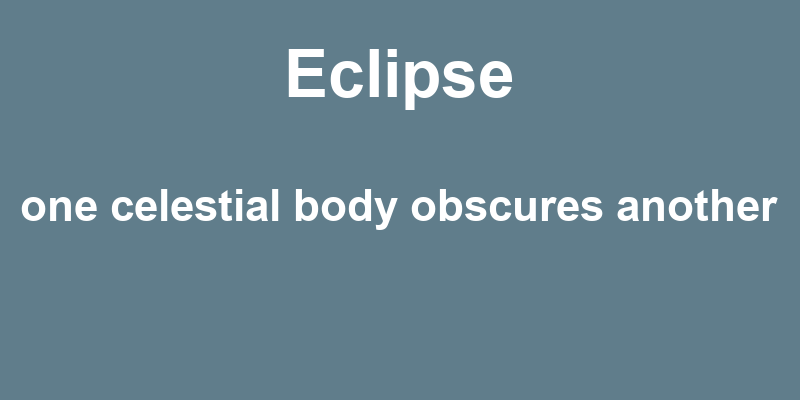Definition of Eclipse
eclipse (noun) - one celestial body obscures another
View other definitions
How can eclipse be used in a sentence?
To the Huichols, an eclipse is the symbol of a new era.
Source
nullSolar eclipse occurs when moon comes in between sun and earth.
Source
nullThis total solar eclipse is the fourth to have occurred since 1999.
Source
nullThe name annular eclipse comes from the Latin annulus, meaning ring.
Source
nullA solar eclipse occurs when the moon passes between the sun and Earth.
Source
nullThis type of eclipse occurs when the moon passes between the sun and the
Source
null'I see that many of the pleasantest things may be in eclipse for a time.'
Source
nullCLANCY: Now, an eclipse occurs when the Earth passes between the sun and the moon.
Source
nullA solar eclipse occurs when the Sun, Moon and Earth are in alignment with the North
Source
nullI dispute Yoo's suggestion that the Presidency was in eclipse between 1974 and 2001.
Source
nullThe only trace of the eclipse was the presence of a few brown feathers on the flanks.
Source
nullA total solar eclipse occurs when the moon passes directly between the earth and the sun.
Source
nullIt will be waiting when your planet reappears from the eclipse, which is half an hour from now.
Source
nullAnd I would imagine that historically people have always said the eclipse is a sign of something.
Source
nullEach time did that name eclipse its predecessor, while recalling it for a moment to fresher memory: John
Source
nullKELLAN: What we are seeing is a total lunar eclipse, which is -- these are pictures in Cheshire, England.
Source
nullA lunar eclipse occurs when the moon passes behind the earth, blocking the sun's rays from striking the moon.
Source
nullThe standing is slippery, and the regress is either a downfall, or at least an eclipse, which is a melancholy thing.
Source
nullA lunar eclipse occurs when the full moon passes into the Earth's shadow, and that happens not very frequently, every few years.
Source
nullDonald Hall, of the University of Hawaii's Institute for Astronomy, called the eclipse "by far the most spectacular I've ever seen."
Source
nullMedia; whilst we also find that the shadow of the 310 B.C. eclipse, that is the one in the time of Agathocles, passed within 100 miles of
Source
nullIn the Hand Early-season drakes in eclipse plumage may lack the typical red head and iridescent green eye mask and can be confused with hens.
Source
nullAn annular solar eclipse occurs when the sun is covered by the new moon, but its shadow is not big enough to cover the entire disc of the sun.
Source
nullPerhaps the ending Hiro flashback with the Samuri and eclipse is the "beginning" of the mutations, maybe Kensei was the first Hero? theTVaddict
Source
nullI reply: "A solar eclipse occurs when the moon, moving in the plane of the ecliptic, crosses the line joining the centres of the sun and the earth."
Source
null29 November 2008 at 10: 59 pm aaahhhh, i live jacksonville. other than humidity (which bella talks about in eclipse), it is pretty great. she did a great job as alice.
Source
nullAnd a solar eclipse is no longer considered by most people to be an act of God or of demons, but simply the fact that the moon can come between the sun and earth, blocking its light.
Source
nullAn annular eclipse occurs when the Moon passes directly in front of the Sun but does not completely obscure it, thus leaving a ring -- an annulus -- of sunlight flaring around the lunar disk.
Source
nullThe fourth is that known as the eclipse of Larissa on May 18, 603 B.C., which was coincident with the final overthrow of the Assyrian Empire, and the fifth is that of Thales on May 28, 585 B.C.
Source
nullAccording to Max Frisch in his novel Homo Faber, the lunar eclipse is also a sign that you're going to be severely punished by the powers that be for sleeping with your own daughter, you weirdo.
Source
nullThe eclipse was a total one, and so far as the description goes the eclipses of April 2, 1493, and March 1, 1504, both respond to the recorded circumstances: both were total and both occurred soon after sunset.
Source
nullSam Harris begins his new book with a celebration of the ideal of cooperation, a value that has been in eclipse among us, and whose absence we feel in every failed attempt to dislodge the country from all the tight places in which we find ourselves these days.
Source
nullIrresistible prompting from some wellspring of his being urged him on to what his reason would have called sheer folly, if that reason had not for the time suffered eclipse, which is a weakness of rational processes when they come into conflict with a genuine emotion.
Source
nullOn the morning of July 22, 2009, the longest total solar eclipse that will occur in the 21st century took place, with most of southeast Asia taking in a partial viewing, and the path of totality (where the total eclipse is visible) passing very close by the most populous islands of Japan.
Source
nullTo be able to see such features as the diamond ring effect (the final flash of light before entering totality), the corona [en] [ja] (the sun's glowing hot outer atmosphere) and the explosive solar prominences [en] [ja] during the eclipse is reliant upon the the moon's distance from the earth, and naturally, the earth's distance from the sun.
Source
null
Tips for Using eclipse in a Sentence
You may have an easier time writing sentences with eclipse if you know what words are likely to come before or after it, or simply what words are often found in the same sentence.
Frequent Predecessors
Words that often come before eclipse in sentences. For example: "the eclipse" or "an eclipse"
- the
- an
- solar
- total
- to
- lunar
- in
- of
- partial
- and
Frequent Successors
Words that often come after eclipse in sentences. For example: "eclipse of" or "eclipse ."
- of
- .
- the
- is
- in
- and
- was
- at
- will
- that
Associated Words
Words that aren't necessarily predecessors or successors, but are often found in the same sentence.
- penumbral
- saros
- totality
- annular
- ide
- lunar
- totally
- solar
- moon
- bodied
Alternate Definitions
- eclipse (verb) - cause an eclipse of (a celestial body) by intervention
- eclipse (noun) - in <em>astronomy</em>, an interception or obscuration of the light of the sun, moon, or other heavenly body, by the intervention of another heavenly body either between it and the eye or between it and the source of its illumination
- eclipse (noun) - the loss, usually temporary or partial, of light, brilliancy, luster, honor, consciousness, etc.; obscuration; gloom; darkness
- eclipse (noun) - see under <er>annular</er>
- eclipse (noun) - see under <er>cycle</er>
- eclipse (transitive verb) - to cause the obscuration of; to darken or hide; -- said of a heavenly body
- eclipse (transitive verb) - to obscure, darken, or extinguish the beauty, luster, honor, etc., of; to sully; to cloud; to throw into the shade by surpassing

